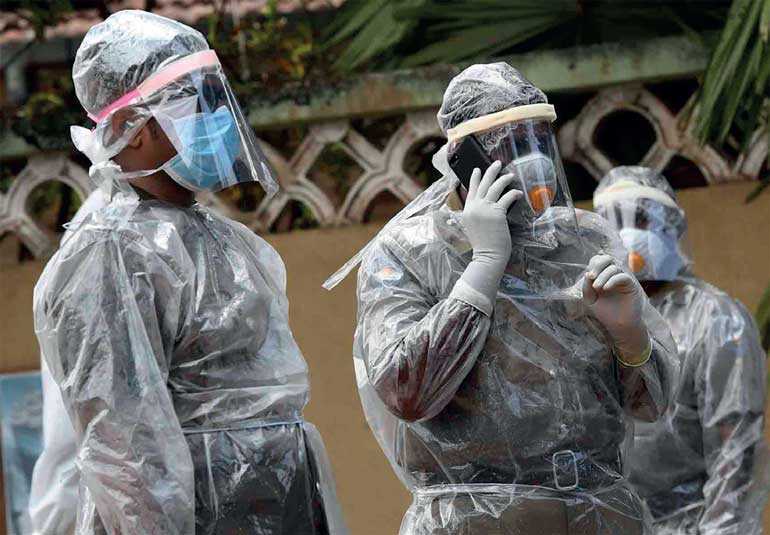Saturday Feb 14, 2026
Saturday Feb 14, 2026
Wednesday, 8 April 2020 00:53 - - {{hitsCtrl.values.hits}}

Should we pin our national strategy on eradication—identifying the very last case? No other country has imagined such a thing to be possible, so it is great to see our premier medical association the SLMA thinking so ambitiously. And even if we succeed in eradicating COVID-19, when finally travel to Sri Lanka is permitted, will we not have to test for IgG anyway? Not to do so would be foolish – Pic by Shehan Gunasekara
I have often wondered why so few doctors win Nobel Prizes in medicine (it’s true: fewer than half of Nobels in medicine or physiology are won by doctors). Don’t get me wrong: I have the greatest respect for the medical profession, and my own life has been saved by doctors more than once. So, it worries me when I see doctors not thinking critically.
The memo released yesterday by the Sri Lanka Medical Association, which has decided to oppose antibody testing for COVID-19, is so fraught with lapses in critical thinking that I’m saving it up for future lectures on, well, ‘Lapses in Critical Thinking’. 
The SLMA says antibody tests to ‘diagnose’ COVID-19 have been discussed at length at local and national level. Such a discussion makes no sense. The SLMA’s own graph shows antibody tests to be pretty useless in diagnosing COVID-19.
Instead, the DETECTION of COVID-19 IgG (Immunoglobulin G) in blood suggests that the patient has recovered from, or asymptomatically experienced, COVID-19 and is no longer an infection risk. Example of an IgG-positive person: Prince Charles. He can safely be hugged (not that I’d want to).
SLMA states that antibody tests are “not the current need of the country” and “is not compatible with the unique pre-emptive policy of Sri Lanka”. How tragic. This suggests that SLMA envisages the eradication of COVID-19 from Sri Lanka. Really?
Should we pin our national strategy on eradication—identifying the very last case? No other country has imagined such a thing to be possible, so it is great to see our premier medical association thinking so ambitiously. And even if we succeed in eradicating COVID-19, when finally travel to Sri Lanka is permitted, will we not have to test for IgG anyway? Not to do so would be foolish.
While PCR remains the gold standard for covid-19 diagnosis, it is expensive. Given the broad overlap in symptoms between COVID-19 and everyday colds and coughs, and the fact that more than 100,000 Sri Lankans have strep throat or cough on any given day, it is impossible to PCR-test everyone who is symptomatic. And we know already that close to half COVID-19 cases are subclinical: they don’t even know they’re sick. The only way such people can be identified, even retrospectively, is through antibody testing.
 Antibody tests are cheap (a few hundred rupees) and can be manufactured in Sri Lanka, whether in the form of point-of-care ELISA tests or lateral flow assay strips. We will need hundreds of thousands (if not millions) of antibody tests in the endemic phase of COVID-19.
Antibody tests are cheap (a few hundred rupees) and can be manufactured in Sri Lanka, whether in the form of point-of-care ELISA tests or lateral flow assay strips. We will need hundreds of thousands (if not millions) of antibody tests in the endemic phase of COVID-19.
Given the amount of testing that will be needed then, and until a vaccine is found (and probably for long after that, too), local capacity for antibody testing will be essential. IgG-positive people, for example, can safely go to work.
Even as the healthcare system engages in minimising the case load in the current acute phase of the epidemic, why not let the private sector and universities collaborate in establishing manufacturing capacity locally? It won’t cost the Government a cent.
I hereby offer to put my money where my mouth is and bring together a consortium help make this happen, within standards set by the National Medicines Regulatory Authority. This will take months to do, anyway. Why oppose it?
It is impossible to contemplate Sri Lanka’s economic recovery without antibody testing. I urge the SLMA to revise its stance. Of course, circumstances will dictate such a revision sooner or later. But when it comes to national economic recovery, sooner is better than later. And when that time comes, we shouldn’t have to struggle to import test kits in a market of spiralling demand.
We need to plan now also to build local capacity for doing all the other things we will have to do to contain outbreaks during the coming endemic phase of this disease. These include greatly increased local manufacturing capacity for hand sanitiser, paper towels, face masks and the like; infection-control protocols for public transport, schools, factories and workplaces; and widespread remote body temperature testing. Unless we plan now, we will face economically crippling lockdowns again and again in the future.
Please think ahead, SLMA.